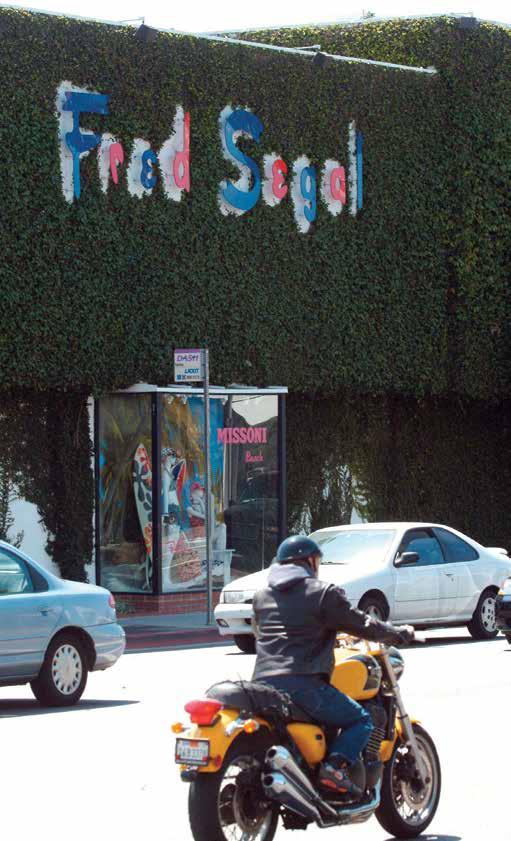HOLLY MILLS THE
to test wash blanks and samples with clients and create developments using local laundry houses. “We live in a very fast world, were time is of the essence, so being able to provide a fast service and a fast response to our clients gives us an advantage and also creates a stronger and more trustful relationship with them,” she said.
38 L.A.’s denim industry remains on the radar of international denim mills. wo r d s _____ ANG E L A V EL A S QUEZ
D
enim manufacturing is a global business, but Los Angeles remains a nerve center for new fashion, premium brands and sustainable newcomers. Advantageously, denim mills like Turkey’s Isko, Mexico’s Global Denim and others, keep a presence with L.A. showrooms and agents. The fabric business remains steady in L.A., despite the fact that many of the mill’s clients are choosing to produce outside the U.S., according to Andreas Herr, Isko marketing and business development manager, despite. “Having a showroom in L.A. has been incredibly beneficial to our clients based in Southern California, as here we can provide a personal service to each one of our clients, showcasing fabrics that need to be seen, touched and sampled,” he said. In the case of L.A. showrooms, if you build it, brands will come—in part because they have to. With lead times shortening and budgets shrinking, there are fewer opportunities for brands to meet on mills’ home turfs. Couple this new normal with situtations like the COVID-19 outbreak, which forced the cancellation of trade shows and led companies to restrict employee travel, and the need for regional showrooms becomes even greater.
At Artisan Cloth’s showroom in Downtown L.A., designers have access to Kurabo’s denim and PFD fabrics from Japan and Thailand, denim from Tavex Mexico and denim from China-based HW Textiles. However, instead of pitching Artisan Cloth as an agent or sales company, CEO Brad Alden Mowry puts his background in creative and technical product development to use, acting as a support system to both sides. “I have had a presence in L.A. with laundries, factories and apparel brands for 15 years and it helps our mills greatly to understand the needs, interests and trends from the West Coast apparel community,” Mowry said. And for brands, he said “we listen to every need and try our best to give better service than expected.” Mexico-based Global Denim opened its Arts District showroom in 2019 as a way to be closer to brands and designers. Between 10 percent and 15 percent of the mill’s business is done in L.A., said Global Denim creative director Anatt Finkler. In general, the denim industry fluctuates, Finkler said, but having a footprint in L.A during the last year has helped stabilize business during global trade uncertainty, evolving sourcing strategies and the ongoing demand for speed and lower prices. “But, even in this situation, with our showroom in L.A. and our relationship and presence within its brands while being here, we feel we have been able to maintain and even increase our business in the area and fortified our relationships with our clients,” she said. The showroom, she added, is an opportunity to have Global Denim’s collection on display and have samples accessible at the moment customers need it. It allows the mill
RIVET NO.9 / APRIL 2020
Style watchers Los Angeles remains a hub for what’s next in denim fashion. Newness is what ultimately drives Artisan Cloth’s clientele. “Customers are always asking for newness in fabric, fit and styling,” Mowry said. They’re not looking for just a basic jean. Brands, he said, are broadening their assortment to include trend items like jumpsuits and non-denim fabrics in denim silhouettes. Fabrics with strong stretch and recovery properties, a good hand feel and vintage look continue to be on the upswing among Global Denim’s Cali clientele. The L.A. market is also ripe for unusual fabrics, which Finkler said reflects local brands’ desire to stay true to their identity. In L.A., mills have an opportunity to introduce and sell novelty and high-end fabrics at a higher price point that a regular mass brand wouldn’t be able to buy, she said. From Isko, Herr said customers are asking for a range of fabrics from the high-stretch skinny look, to the authentic vintage vibe that’s rich in character, all made with sustainable attributes. The mill is also seeing ramped up requests for non-denim fabrics, which it is responding to with Arquas, a collection of fabrics that cater to the activewear and sportswear industries. The fabrics stand out in the industry for being woven, although many of them have the look and hand feel of knits, Herr said. Sustainable steps Isko’s showroom also serves as “an important internal touch point” for the mill. The








